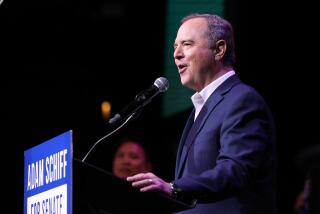Forbes Quits Race With ‘No Regrets’
Steve Forbes abruptly quit the presidential race Wednesday after spending more than four years and $76 million on a quest that helped shape Republican thinking but won him little personal following.
The multimillionaire publisher made his decision after finishing a distant third in Tuesday’s Delaware primary, which he won in 1996 during his first try for president.
“I have no regrets except not winning,” Forbes told NBC News. “But I think we did help change the agenda in America.”
By abandoning the race, Forbes essentially sets up a two-man contest for the Republican nomination between Texas Gov. George W. Bush and Sen. John McCain of Arizona. Both immediately laid claim to Forbes’ modest base among anti-establishment Republicans and foes of the Internal Revenue Service. Alan Keyes, the former Reagan administration diplomat, also remains in the race.
After offering their polite regrets Wednesday, Bush and McCain shifted their sights from Forbes and got to the business at hand: trading shots over their commitment to campaign-finance reform.
“If he won’t support reform of the system then he becomes part of the problem,” McCain said.
“It’s one thing to say something, it’s another thing to do it,” Bush retorted.
With the Forbes vote there for the taking, analysts differed over which candidate would benefit most as the campaign heads to South Carolina, which hosts a crucial Republican showdown in nine days. Many thought Bush would quickly gather up Forbes’ conservative support. But McCain could also make gains, some said, by consolidating those anti-Bush voters who favored Forbes.
In a close contest--which South Carolina could be--a few thousand votes might make a difference. “‘It’s like a field goal in a close game,” said John Weaver, McCain’s political director. “It matters.”
In a larger sense, Forbes’ departure represents a setback for the social-conservative wing of the Republican Party, which has lost considerable influence and now lacks a viable candidate heading into November. Others who earlier dropped out include former Vice President Dan Quayle, New Hampshire Sen. Bob Smith and Gary Bauer, former head of the Family Research Council.
Forbes’ withdrawal also demonstrated that “money isn’t everything,” as Republican analyst William Kristol put it, noting McCain’s emergence on a relative shoestring compared to the $34 million that Forbes spent in 1999 alone. No figures are available on how much he has spent on the campaign this year to date.
“The good news is that people make up their minds independently and you can’t buy votes,” Kristol said.
Money is what always distinguished Forbes’ platinum-plated campaign, which ended up spending well over $1,000 a head for the 36,000 votes he garnered this year in Iowa, New Hampshire and Delaware. “Without money, he probably would have been treated as a crackpot,” said Gary C. Jacobson, a UC San Diego political science professor.
Alone among the eight Republican dropouts, however, Forbes does leave some legacy. The ideas he plucked from conservative think tanks and pushed to the fore--most notably his signature flat-tax proposal and advocacy of medical savings accounts and privatization of Social Security--will likely endure.
“Bush and McCain are both talking about the need to work toward a fairer, flatter tax system,” said Dan Schnur, a senior McCain strategist. “That isn’t the kind of discussion you heard within the party before Steve Forbes.”
The longshot candidate made his decision to quit the contest just hours after the Delaware polls closed, according to campaign manager Bill Dal Col, who spoke with Forbes by telephone around midnight.
Forbes concluded “basically that there wasn’t a way from here to there in terms of the nomination . . . and the best thing to do if you’re not going to get the nomination is to exit the race,” Dal Col said. He said Forbes has ruled out a run for Senate this year from his home state of New Jersey--as some urged--and has no other political plans “at this point.”
He has no immediate plans to endorse Bush, McCain or Keyes.
Forbes launched his first bid for president in the fall of 1995 after ex-Rep. Jack Kemp, his friend and first choice, declined to make the race. Forbes briefly surged in polls--becoming the sort of political phenomenon McCain is today--on the strength of his call for abolishing the IRS and establishing a flat 17% tax rate on all income.
But his support dwindled as Forbes failed to expand his message beyond that one-note economic plan. Instead, he launched a barrage of brutally negative TV ads targeting front-runner Bob Dole--attacks that ended up backfiring.
After winning primaries in Delaware--which Dole skipped--and Arizona, Forbes quit the race in March 1996, roughly $37 million poorer for the effort.
He resumed running almost immediately after Dole lost the November election. This time, Forbes abandoned his emphasis on economic issues and targeted the Christian conservatives he had openly scorned. He said ending legalized abortion was even more important than enacting his cherished flat-tax plan.
And after relying chiefly on television ads four years ago, Forbes built formidable campaign organizations on the ground in several early-voting states. The move paid off with a stronger-than-expected second-place showing in the Iowa caucuses Jan. 24. But he finished third in New Hampshire followed by his poor finish in Delaware.
Part of the problem was image. For all his money and the tireless hours spent campaigning, Forbes was never able to shake the nerdy persona that played against the presidential prototype.
“People have a Hollywood vision of what the president’s supposed to be like. Steve doesn’t match that very well,” said Sal Russo, a sympathetic GOP consultant in Sacramento. “He’s just like a geeky guy.”
But tactically, Forbes’ biggest mistake may have been adjusting his campaign to deal with the conditions he faced in 1996--without considering how circumstances had changed in 2000. The chief difference this year is that many social conservatives--hungry to back a presumed winner--lined up early behind Bush, despite his more moderate stance on social issues.
Forbes “tried to morph himself from an economic supply-sider into a newborn social conservative and he just hit a wall,” said Scott Reed, who managed Dole’s ’96 campaign.
After learning of Forbes’ departure, Bush and McCain both reached out to his supporters during a day of campaigning in South Carolina.
“I will say that Steve brought some interesting ideas into the process,” Bush said on NBC’s “Today” show, immediately dropping the testy tone he displayed in recent debates with Forbes. “ . . . I’m going to work hard to appeal to his voters and give his conservative voters a home in this primary in South Carolina and other important states.”
McCain, who enjoyed a friendly campaign-trail relationship with Forbes, made his own play for the suddenly dispossessed. “Most Republicans think my tax cut . . . is far more conservative than Gov. Bush’s tax plan. I think they’ll be headed in my direction,” McCain said between campaign stops.
Most analysts suggested Bush is more likely to gain from Forbes’ exit, if only because he no longer need fight a two-front war. “It simplifies Bush’s strategy,” said Eddie Mahe, a veteran GOP strategist and neutral observer. “It’s a lot easier for Bush to just go one-on-one with McCain.”
Some suggested McCain could also benefit. “The Forbes vote has a very large protest element and antiestablishment tenor,” said Kieran Mahoney, another neutral party strategist. “And that tenor is better suited, frankly, to Mr. McCain than to Mr. Bush.”
Also on the campaign trail Wednesday, Bush received the backing of the National Right to Life Committee, the nation’s largest anti-abortion group, which is already running radio ads against McCain in South Carolina. McCain dismissed the endorsement, saying that the organization was one of many Washington interest groups that had “turned a cause into a business.”
Times staff writer Eric Slater with McCain contributed to this story.
More to Read
Sign up for Essential California
The most important California stories and recommendations in your inbox every morning.
You may occasionally receive promotional content from the Los Angeles Times.











